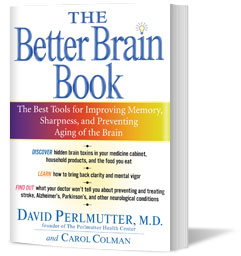Book Summary: The Better Brain Book by David Perlmutter

Improve memory and sharpness
Have you reached age 40 or beyond and find that your brain isn’t as efficient and reliable as it used to be? Many people assume that this is a natural part of aging, but according to the author of The Better Brain Book, this is simply not true. Cognitive decline is caused by free radical damage and inflammation that accumulates over the years. (Free radicals are single oxygen molecules that attach themselves to and then steal a molecule from healthy cells; inflammation is a defensive response by the immune system which attacks, not just the true invaders, but even sometimes every part of the body) He states that if an individual keeps forgetting where they put things or what they were about to do or has a hard time trying to articulate with words, these are signs that the brain is overrun with free radical damage. He encouragingly explains how these factors can be overcome by various lifestyle changes, particularly diet and supplements.
4 Behaviors That Lead to Brain Demise
The book is divided into three sections:
Part 1—Is Your Brain at Risk?
Part 2—Tools for a Better Brain
Part 3—Specific Brain Disorders and What to do About Them
The first chapter in Part 1 describes four behaviors that lead to brain demise:
1. Regularly taking any over-the-counter (OTC) or prescription drugs. Many commonly used drugs rob the brain of important nutrients.
2. Not regularly reading food labels. If you do not read the labels of everything you eat, you are probably consuming foods that have “brain busting” ingredients.
3. Drinking unfiltered tap water, spraying insecticides around the home, or using underarm deodorant or dandruff shampoo which all may be exposing your brain to toxins that cause it to age faster.
4. Being frequently “stressed out.” Stress hormones can destroy the brain’s memory center.
Take a Brain Audit
Chapter two consists of a brain audit that you can take to determine to what degree your brain is at risk. Chapter three explains the risk factors that affect the brain.
Chapter four lists the OTC drugs and prescription drugs that are known to deprive the brain of necessary nutrients and also provides advice on how to rectify it.
Part two (chapters 5 to 11) explains how to build a better brain. Chapter 5 is devoted to diet and includes a suggested menu. Chapter 6 suggests supplements that protect the brain. Chapter 7 suggests lifestyle factors that affect the brain including sleep, excessive stress, exercise and recreation. Chapter 8 explains toxins that adversely affect the brain. Some of these toxins include: pesticides, mercury, aluminum, lead, MSG, artificial sweeteners, hydrolyzed vegetable protein and electromagnetic fields. Chapter 9 contains a variety of brain games/exercises that can enhance your mental acuity.
4 Tests to Determine if Your Brain is at Risk
In chapter 10 the authors describes four tests that are available from most doctors that tell if a body is winning the battle over inflammation. The first is a Lipid Peroxide Test. This is a urine test that measures the degree of free radical activity informing the testee whether or not they are getting enough antioxidants (antioxidants are foods and supplements that thwart free radical activity) to counteract free radical damage and inflammation. Free radical damage is linked to Alzheimers, Parkinson’s, and heart disease. You can actually get a kit to do this at home similar to a home pregnancy test. They are available online or in health food stores.
The second test is a Homocysteine Check. The author suggests that many doctors don’t offer it because the solution is a simple, inexpensive vitamin regimen that is not promoted by pharmaceutical companies.
The third test is the Apo E4 Genotype (otherwise known as the Alzheimer’s gene) test. People who have inherited the Apo E4 gene from one or both parents are at a much higher risk for developing Alzheimer’s disease. This test reveals whether the testee has this gene.
The fourth test is the C-Reactive Protein Test. This is a blood test which indicates to what extent inflammation has permeated the body. This test is an excellent predictor of brain disorders such as Alzheimer’s and stroke.
6 Essential Steps to Brain Health
If you want to protect your brain but don’t have time or inclination to read the entire book, in chapter 11 the author summarizes most of the material in the book by giving six essential steps to a better brain:
Step 1—Eliminate transfat, otherwise known as hydrogenated fats, from your diet. This type of fat is found in packaged snacks and fried foods. It can also be found in other foods, too, so you have to read the ingredient labels. This type of fat slows the brain and accelerates aging.
Step 2—Get the Homocysteine Level checked (one of the tests described above).
Step 3—Take the following supplements:
300 mg. of DHA daily
50 mg. daily of B1, B2, B6, and B12
400 mcg. daily of folic acid
200 I U of vitamin E (d-alpha, not dl-alpha)
Vitamin E is the only antioxidant that can penetrate the cell membrane.
Step 4—Find out if any drugs you are taking regularly are known to deplete B vitamins and antioxidants.
Step 5—Get eight hours of sleep every night. This allows the brain to do necessary repair work that prevents toxins from accumulating over time. It also enhances the ability to learn.
Step 6—Learn to do something new that is fun and challenging. New challenges create new dendrites in the brain. Dendrites are the connections between neurons that process and assimilate information. The more dendrites you have, the better your brain cells can communicate, and the smarter you will be.
Part 3 of the book (chapters 12 to 17) discusses six brain disorders and what to do about them. A whole chapter is devoted to each one. The six are: stroke, vascular dementia, Alzheimer’s disease, Parkinson’s disease, Multiple Sclerosis (MS), and Amyotrophic Lateral Sclerosis (ALS).
The appendices at the end of the book include recipes and additional resources.
This book
is an excellent resource for anyone interested in remaining sharp cognitively
throughout the last years of his or her life.
Even if you don’t have time to read the entire book, you can gain much
benefit by just skimming the book. You can also visit the author's website for more information:
The author's website
- The Better Brain Book by Dr. David Perlmutter | iNutritionals
In The Better Brain Book, celebrated Neurologist Dr. David Perlmutter provides all the tools any reader will need for rejuvenating the mind, whether they've become forgetful and less able to focus at work, or are trying to help a loved one who has su








